Let’s be real, Luma AI is awesome.
It creates stunning 3D visuals, AI videos, and more. But what if you don’t want to pay or just need simpler tools to start creating now?
Good news:
You don’t have to stick with one tool or pay premium prices. There are powerful free Luma AI alternatives that can get the job done (and sometimes even faster).
Why This Matters Right Now
AI content creation is evolving fast.
If you’re a creator, developer, educator, or digital marketer, using the right tools isn’t optional, it’s survival.
- Budgets are tight
- Speed matters
- Everyone’s racing to create the best content, faster
Let’s dive in because free doesn’t mean basic anymore.
What is Luma AI & Why Are People Looking for Alternatives?
Luma AI is known for its cutting-edge 3D capture and photorealistic rendering. It uses AI to generate ultra-realistic visuals, making it a favorite among developers, content creators, and 3D enthusiasts.

But despite its strengths, many users are exploring alternatives and for good reason.
First, Luma AI has a steep learning curve. It’s built for professionals, which can make it overwhelming for beginners or casual creators who just want quick results.
Second, while it offers a free trial, it gets expensive quickly. Not everyone is ready to commit to a premium plan especially indie creators or students.
Lastly, Luma isn’t always ideal for every use case. Some users just need basic animations, AI generated videos, or lightweight tools that don’t require heavy hardware or technical skills.
That’s where free, user-friendly alternatives come in and we’ve rounded up the best of them.
Looking for free tools like Luma AI? Explore 10+ powerful, free alternatives for video, 3D captures, and AI animation.
Master Viggle AI (2025)
Learn how to turn photos into jaw-dropping animated videos. No editing skills needed.
No credit card needed!
Top 10+ Free Luma AI Alternatives for 2025
Luma AI might be powerful but it’s not your only option. Whether you’re working on 3D visuals, text-to-video content, or interactive animations, there are incredible tools out there that are 100% free or offer generous starter plans.
Below are 10+ smart alternatives worth exploring, especially if you’re a creator, marketer, or startup on a budget.
1. Pika Labs: Best for Short AI Video Clips

Pika Labs is an emerging AI tool that turns simple text prompts into animated video clips. The interface is clean, minimal, and designed for quick outputs.
Key Features:
- AI-generated videos from text
- 16:9 and square formats
- Scene-based storytelling
Use Case:
Perfect for social media marketers, content creators, meme creators, and TikTok-style storytelling.
Pricing:
- Free tier available
- Pro plans offer faster rendering and longer video lengths
Limitations:
- Free users may experience render queues
- Limited customization options
2. Runway ML: Best All-in-One AI Video Suite
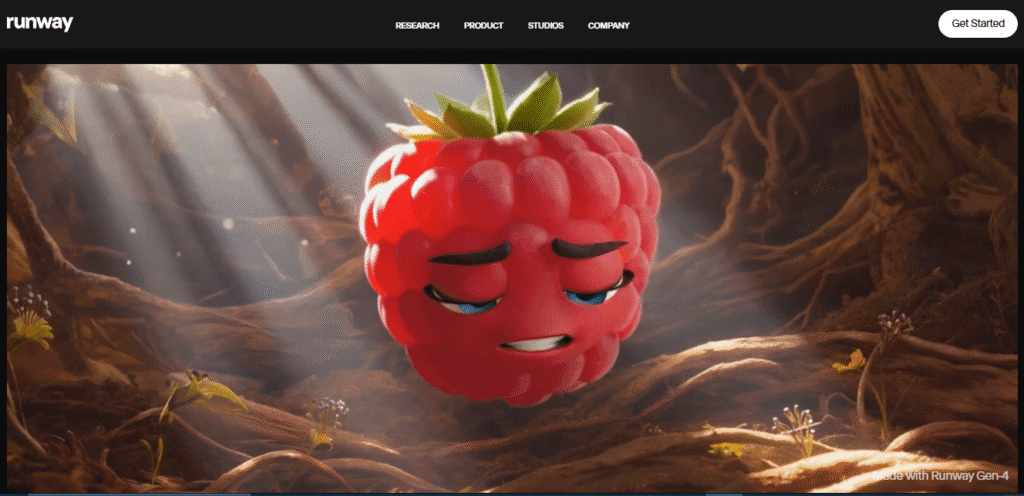
Runway ML is a powerful platform offering tools like green-screen removal, video editing, inpainting, motion tracking, and Gen-2 text-to-video AI.
Key Features:
- Text-to-video (Gen-2)
- AI video editing tools
- Stable Diffusion & Gen-1 integration
- Collaborative workflows
Use Case:
Ideal for agencies, YouTubers, and brands needing a complete creative suite powered by AI.
Pricing:
- Free plan with credits
- Paid plans unlock more features & higher limits
Limitations:
- Limited video duration in free plan
- Some tools restricted to Pro users
3. Kaiber AI: Best for Music Videos & Art Visuals
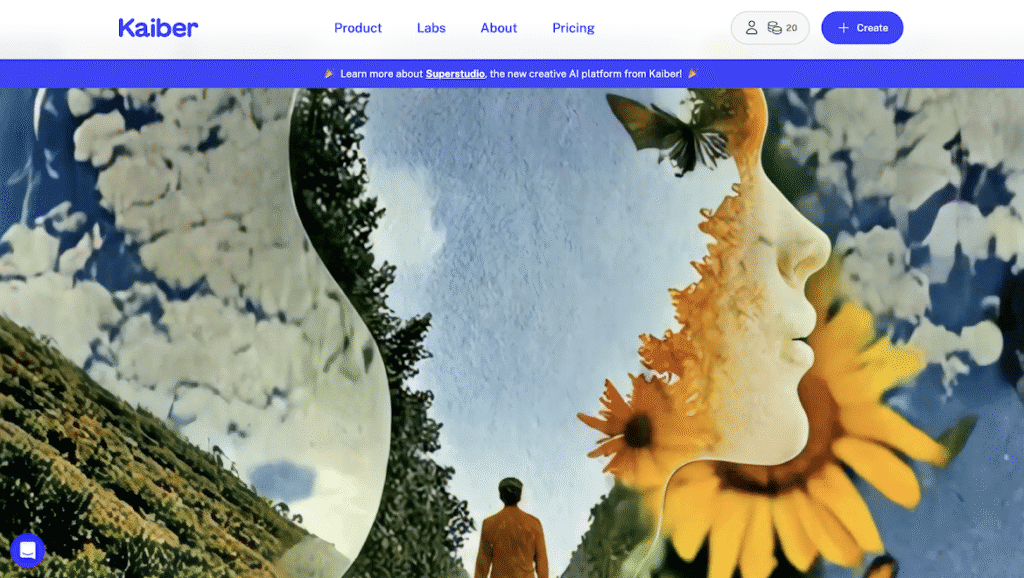
Kaiber lets you transform text prompts, images, or audio into highly stylized motion graphics and animated art. It’s especially popular with music artists and NFT creators.
Key Features:
- Text/audio-to-video conversion
- Artistic style presets
- Beat-synced visuals
Use Case:
Great for musicians, digital artists, and those in creative fields looking for visual storytelling.
Pricing:
- Free credits per month
- Subscription unlocks longer videos
Limitations:
- Free tier includes watermarks
- Rendering times vary
4. Sora by OpenAI: Best Cutting-Edge Tech (Waitlist)

Sora is OpenAI’s upcoming model that turns text into high-quality, detailed videos. Though not fully available yet, it shows promise with its incredible realism and scene comprehension.
Key Features:
- Natural motion from text prompts
- Real-world scene understanding
- Advanced object rendering
Use Case:
Future-focused creators looking to test cutting-edge tech for filmmaking, advertising, or education.
Pricing:
- Not yet public
- Likely to include API access and enterprise use cases
Limitations:
- Waitlist-only (as of 2025)
- No public release date
5. Deevid AI: Best for Educators & Presenters

Deevid makes AI video creation as easy as drag and drop. It’s built for simplicity, letting anyone build narrated videos from scripts with visual templates.
Key Features:
- Script-to-video conversion
- Stock visuals + narration
- Brand-safe video creation
Use Case:
Marketers, educators, and small business owners creating explainer videos or ads.
Pricing:
- Free trial with limited exports
- Premium unlocks longer content
Limitations:
- Fewer design options
- Mostly static scenes
6. LeiaPix: Best for 2D to 3D Image Animation
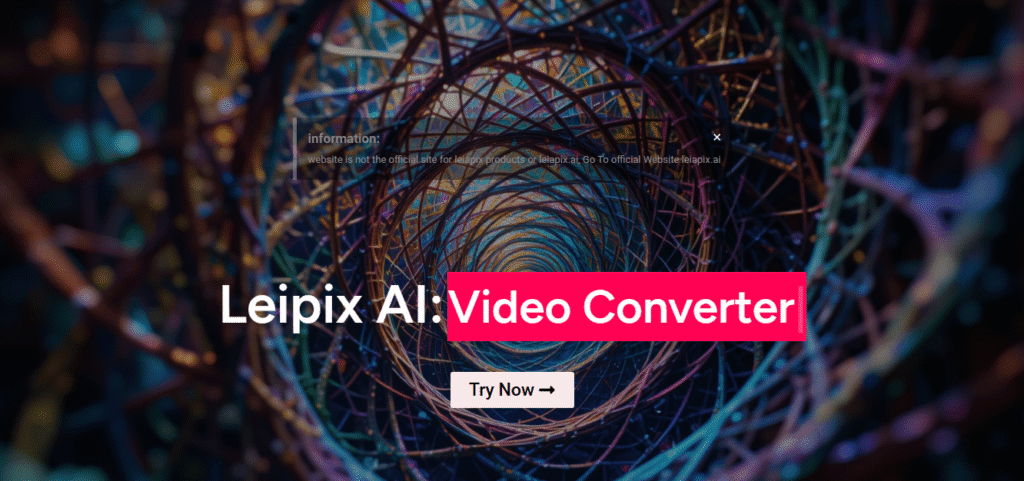
LeiaPix lets you animate static images and add 3D motion effects to give photos depth and dimension.
Key Features:
- 2D to 3D photo conversion
- Motion path editing
- Export to GIFs or short videos
Use Case:
Photographers, Instagram creators, and artists enhancing visuals with subtle motion.
Pricing:
- Completely free
Limitations:
- Only works with still images
- No text or video generation
7. Colossyan Creator: Best for Talking AI Avatars
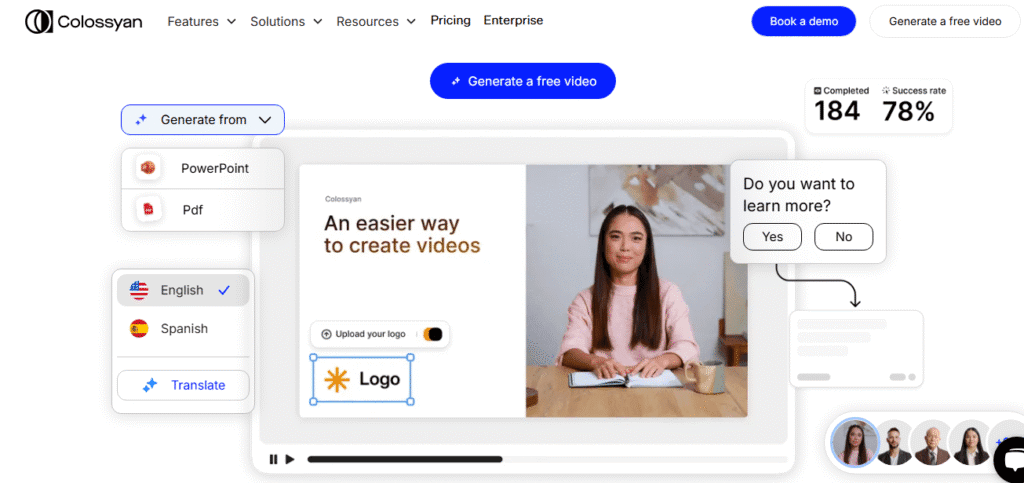
Colossyan offers lifelike AI avatars that speak your scripts. It’s an excellent tool for making training videos or internal communications.
Key Features:
- AI avatars with voice sync
- Multilingual options
- Presenter-style video templates
Use Case:
Corporate training, e-learning, business presentations.
Pricing:
- Free basic plan
- Paid tiers include more avatars and export options
Limitations:
- Watermarks on free exports
- Voice options limited unless upgraded
8. Krikey AI: Best for 3D Animation & Gaming
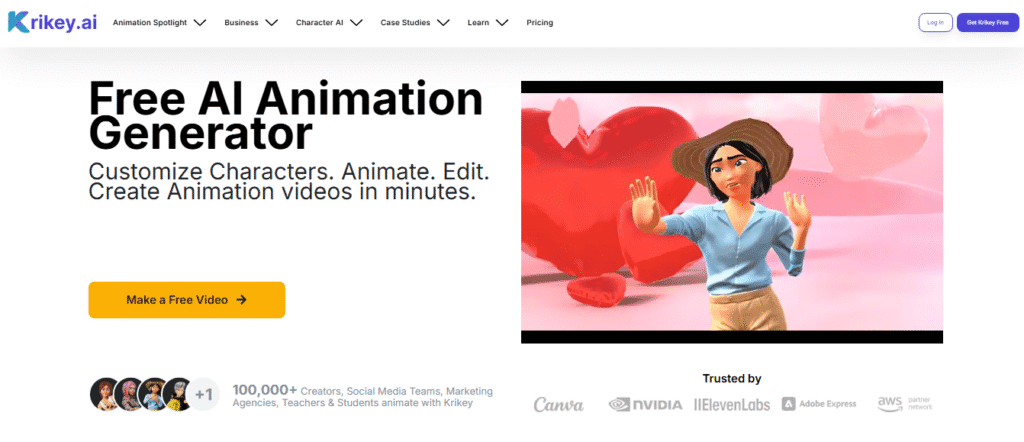
Krikey allows users to create 3D animated characters with prebuilt actions. It’s highly suitable for game devs and digital designers.
Key Features:
- AI animation generator
- Character creation
- Unity/Blender export support
Use Case:
Game development, interactive storytelling, kids’ content.
Pricing:
- Free starter account
Limitations:
- Some export formats require paid access
- Limited template library
9. Synthesia: Best for Hyper-Realistic Presentations
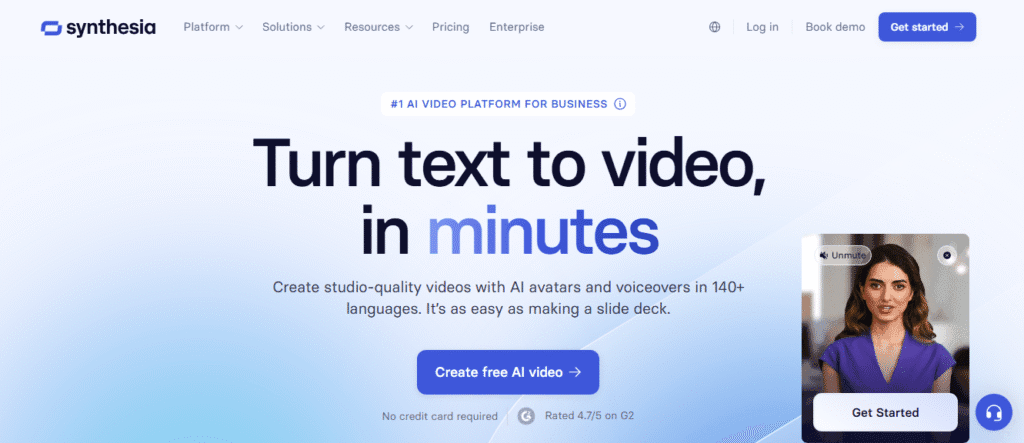
Synthesia offers highly realistic avatars that read your script in dozens of languages. Trusted by brands like Google and Reuters.
Key Features:
- Human-like avatars
- Multilingual support
- Slide + voice integration
Use Case:
Enterprise training, product demos, onboarding videos.
Pricing:
- Free demo access
- Business plans for full features
Limitations:
- Limited usage on free/demo plan
- No bulk export without upgrade
10. D-ID: Best for Talking Head Animations

D-ID takes any image and makes it speak using AI voice and facial animation. It’s often used in personalization, e-learning, and AR applications.
Key Features:
- Text-to-speech with face movement
- Live portrait animation
- Voice cloning options
Use Case:
Interactive avatars, chatbots, marketing.
Pricing:
- Free demo tier
- Paid plans for watermark removal and high-res videos
Limitations:
- Basic quality for free tier
- Short video lengths
11. Dreamlux AI: Best for Visual Scene Creation
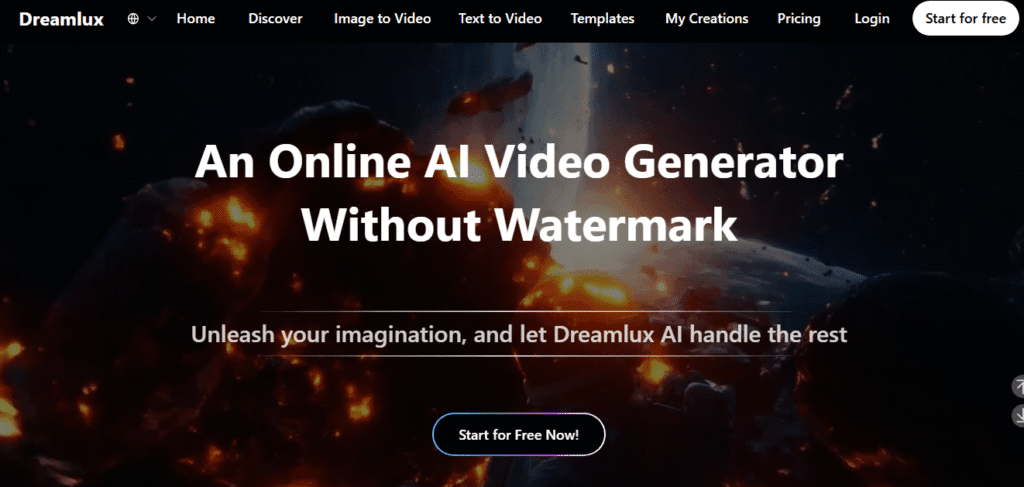
Dreamlux AI helps you build rich, story-based video scenes from text. It’s gaining popularity for fast output and scene customization.
Key Features:
- Scene-based text-to-video
- Fast rendering times
- Template library
Use Case:
Storyboard creators, scriptwriters, storytellers.
Pricing:
- Free plan with full access
- Optional paid upgrades
Limitations:
- Still evolving; not yet enterprise-grade
- Limited third-party integrations
Luma AI vs. Top Free Alternatives (Quick Comparison Table)
If you’re in a hurry or want a quick overview, this table compares Luma AI with top competitors across key criteria:
| Tool | Free Tier | Best For | Standout Feature | Biggest Limitation |
| Luma AI | Limited | 3D photorealism & scans | Neural rendering & capture | Becomes paid after trial |
| Pika Labs | Yes | Short AI video clips | Fast text-to-video generation | Basic quality for free users |
| Runway ML | Yes | AI video editing & effects | Gen-2 & multimodal tools | Watermarks on exports |
| Kaiber | Yes | Music visuals & VJ loops | Beat-synced dynamic motion | Short durations (free tier) |
| Deevid | Trial | Storytelling presentations | Easy drag-and-drop builder | Render limits & static scenes |
| LeiaPix | Yes | 2D → 3D photo animations | Parallax motion depth | Works only on images |
| Synthesia | Demo only | Lifelike AI presenters | Human avatars in 40+ languages | Expensive for regular users |
| Colossyan | Yes | Training videos & LMS | Talking avatars with text sync | Watermarks unless upgraded |
No one tool fits all. Choose based on your use case (see below) and whether you need avatars, animation, or 3D realism.
Create Studio-Quality Videos with Kling AI (2025)
Just type what you imagine and watch it come to life. Yes, it's that simple.
Which Tool is Right for You?
Choosing a tool isn’t just about features. It’s about what you’re building. Here’s how to pick the best Luma AI alternative based on your role or project type:
For Creators, YouTubers & Short-Form Video Makers
If you create fast content for YouTube Shorts, TikTok, or Reels:
Use:
- Pika Labs for short videos with story vibes
- Runway ML to edit, enhance, and add AI effects
Why? These tools are built for speed, storytelling, and viral formats.
For Educators, Online Coaches & Corporate Trainers
If you build courses, explainer videos, or HR training:
Use:
- Colossyan Creator for avatar-based narration
- Synthesia for hyper-realistic presenters with multilingual voiceovers
Why? They help you produce professional lessons without needing to be on camera.
For Game Developers, AR/VR Creators & Tech Teams
If your work involves 3D modeling, virtual worlds, or immersive experiences:
Use:
- Luma AI for photorealistic 3D scanning and neural rendering
- LeiaPix to animate images with 3D motion for interfaces or effects
Why? These tools are made to handle realism and spatial precision.
For Social Media Marketers, Designers & Agencies
If you’re crafting scroll stopping ads or content for Instagram, Twitter, or Facebook:
Use:
- Kaiber for audio-reactive visuals and fast style shifts
- Deevid AI for polished, branded short videos with templates
Why? They deliver visual punch in under a minute thatperfect for ad campaigns or trendjacking.
How to Choose the Right Luma AI Alternative
With so many free tools out there, choosing the best one comes down to what you need. Ask yourself:
1. What’s your end goal?
- Want 3D scanning and realistic assets? Try Luma AI or LeiaPix.
- Need AI-generated video from text? Look at Pika Labs or Runway ML.
- Creating lessons or talking avatars? Go for Synthesia or Colossyan.
2. Can you live with watermarks or export limits?
Many free tools come with branded watermarks or capped render quality. If that’s a deal-breaker, check if the paid plans are worth it or look for watermark-free options like LeiaPix.
3. Do you prefer online tools or desktop software?
- Browser-based tools (e.g., Deevid, Runway ML) are faster to start and no downloads.
- Downloadable software (e.g., Spline for 3D) often gives you more control and speed offline.
4. How important is support and community?
If you’re learning or building long-term, pick a tool with a helpful Discord, YouTube tutorials, or active documentation. Platforms like Runway and Synthesia offer stronger ecosystems than newer apps.
Don’t just chase features. Match the tool to your workflow, skills, and future goals.
Videogen vs Veed.io: Ultimate AI Editor Face-Off (2025)
Not sure which editor to use? We tested both
See who wins.
Pros & Cons of Using Free Luma AI Alternatives
Free tools are tempting especially if you’re a student, indie creator, or startup. But they come with trade-offs. Let’s break it down:
Pros of Free AI Tools:
- Zero upfront cost: Test ideas without paying a cent.
- Great for prototyping: Quickly build and iterate without setting up full pipelines.
- Low risk: No long-term contracts or commitments. Use what works and drop what doesn’t.
Cons to Keep in Mind:
- Watermarks & branding: Your videos might include the platform’s logo.
- Feature limits: Some tools restrict resolution, export formats, or render time.
- Not always scalable: Free tiers can be great for individuals but may fail to support team collaboration or larger client projects.
Free tools are perfect for experimentation and early-stage work but if you’re scaling or going pro, upgrading might be worth the cost.
Expert Tips to Get the Most from Free AI Video Tools
Free AI tools can be incredibly powerful but only if you know how to work with their limits. Here are key strategies top creators use to get professional results from no-cost platforms:
1. Batch Render During Off-Peak Hours
Many free tools experience traffic spikes that slow down processing or throw errors. Try rendering late at night or early morning to get faster queue times.
“I schedule all my AI renders after midnight. The difference in speed is night and day literally.”
Aamir, Indie Game Developer
2. Treat AI Outputs as Drafts, Not Finals
AI-generated visuals often need fine-tuning. Whether it’s enhancing colors, fixing animation glitches, or adding voiceovers, always plan for a pos production step.
“The best creators don’t just use AI, they edit it.”
Jordan L., YouTube animator with 120K+ subs
3. Back Up Everything You Create
Free tools can change their terms, shut down, or limit access without notice. Always export and save your projects (preferably in multiple formats) to your local drive or cloud storage.
“I lost three promo videos because the platform deleted my free account after inactivity. Never again.”
Maria V., Freelance Marketer
4. Mix and Match Tools for Best Results
No single tool does it all. Use one for generation (like Pika Labs), another for editing (like CapCut or DaVinci Resolve), and another for effects (like Canva or Runway).
5. Stay Plugged into Creator Communities
Join Discord servers, Reddit subs, or newsletters related to these tools. New features, tricks, and workarounds pop up daily and early adopters often get beta access before the public.
FAQ’s: Quick Answers from Luma Alternatives
What is Luma AI used for?
Luma AI creates ultra realistic 3D visualizations using neural rendering commonly used in AR/VR apps, product visualization, and game design.
Is Luma AI free to use?
Luma AI offers a free tier, but most advanced tools like export and high-res rendering require a paid plan.
What’s the best free alternative to Luma AI?
For text-to-video content, Pika Labs is a top choice. For editing and creator workflows, Runway ML delivers more depth. It depends on your exact needs.
Can I use Luma AI alternatives for commercial use?
Some tools allow it, others don’t. Always check the tool’s licensing. Tools like Colossyan or LeiaPix may require attribution or a paid plan for commercial projects.
Conclusion: What to Do Next
You don’t need to spend hundreds of dollars to start creating with AI. If you’re exploring 3D visuals, avatar videos, or short-form content, these free Luma AI alternatives can help you build, test, and scale without breaking your budget.
Here’s what to do now:
- Pick 2-3 tools that match your creative goals
- Try them out and compare results
- Bookmark the ones that deliver value
- Only upgrade when you’re sure it fits your long-term workflow
“Free tools are your launchpad, not your limit. Use them smartly, and you’ll be amazed at what’s possible.”
Liam H., AI Creator & Startup Consultant
Want more tools like these to ranked, reviewed, and ready to use?
Explore free AI tools, walkthroughs, and smart creator hacks.